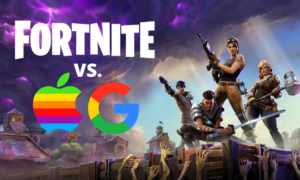 In a legal spectacle closely observed by the technological and gaming communities. Epic Games, the creator of the immensely popular video game Fortnite, has initiated a legal dispute with Google in a San Francisco courtroom. This high-stakes litigation encompasses a plethora of issues, including allegations of monopolistic practices, antitrust concerns, and control over the distribution of mobile applications. In this discourse, we shall delve into the intricate details of the case, elucidate the laws and motivations underpinning it, examine Google’s retort, and scrutinize the potential ramifications for both entities.
In a legal spectacle closely observed by the technological and gaming communities. Epic Games, the creator of the immensely popular video game Fortnite, has initiated a legal dispute with Google in a San Francisco courtroom. This high-stakes litigation encompasses a plethora of issues, including allegations of monopolistic practices, antitrust concerns, and control over the distribution of mobile applications. In this discourse, we shall delve into the intricate details of the case, elucidate the laws and motivations underpinning it, examine Google’s retort, and scrutinize the potential ramifications for both entities.
Fortnite vs. Google Case Overview

The genesis of this legal saga traces back to 2020 when Google expelled Fortnite from the Google Play Store. The creators retaliated by implementing its proprietary in-app payment system, thereby contravening the policies of Google and Apple. This strategic maneuver enabled Epic Games to evade the exorbitant 30% commission levied by both tech behemoths on developers’ in-app transactions. Google’s rejoinder was swift and decisive; they promptly banished Fortnite from the Play Store. The legal altercation orbits around several pivotal themes:
- Monopoly Allegations: Epic Games posits that Google has illicitly established a monopoly over Android applications through its hegemony in the Google Play Store. This contention aligns with the broader scrutiny confronting major technology corporations regarding their dominance in the market.
- Antitrust Concerns: This legal skirmish accentuates antitrust apprehensions as Epic Games contends that Google’s stringent policies throttle competition within the realm of application marketplaces. This lawsuit emerges at a juncture when regulatory bodies globally are intensifying their scrutiny of technology titans for purported anticompetitive practices.
- Control Over App Distribution: At the crux of the matter lies the jurisdiction over app dissemination. Epic Games contends that Google’s actions hinder equitable competition by constraining users’ choices for downloading and accessing applications on Android devices.
Laws Behind the Case
Several laws and intentions have propelled this legal strife:
- Antitrust Laws: Antitrust statutes are crafted to foster equitable competition and forestall monopolistic machinations. In this instance, Epic Games invokes these laws to challenge Google’s dominion over the Android app ecosystem, asserting that it stifles competition.
- Developer Autonomy: Epic Games’ motivations encompass championing greater autonomy for application developers. By contesting Google’s 30% surcharge on in-app purchases and the constraints imposed on app distribution, Epic aspires to nurture an open and competitive app milieu.
- Economic Imperatives: The crux of the legal fracas revolves around economic imperatives. Epic Games endeavors to alleviate the fiscal burden on app developers by sidestepping Google’s levy, while Google endeavors to safeguard its revenue streams from the Play Store. Google staunchly maintains that its policies, including the 30% commission, are indispensable for upholding the Play Store’s integrity and security.
Google’s Response

Google has vehemently defended its stance in this legal wrangle. The tech titan contends that its actions fell within the ambit of its policies when it ousted Fortnite from the Play Store. Google asserts that Epic Games knowingly breached these policies by introducing its independent payment system, thereby instigating Fortnite’s expulsion. The company underscores its commitment to preserving a secure and dependable app ecosystem for Android users, positing that its policies, including the 30% surcharge, are imperative for sustaining the Play Store’s reliability.
Implications of the Case
The outcome of this legal tussle carries momentous implications for both entities and the wider technology arena:
- App Distribution Landscape: The resolution of this case could reshape the contours of app distribution. If Epic Games emerges triumphant, it may pave the way for more flexible payment alternatives for developers, potentially challenging the dominance of Google and Apple’s app marketplaces.
- Economic Reverberations: This case harbors substantial economic repercussions. A verdict favoring Epic Games could lead to diminished revenues for Google and Apple, concurrently affording greater control to app developers over their earnings.
- Antitrust Precedent: A victory for Epic Games might establish a precedent for antitrust litigations against other technology conglomerates, spotlighting the potential anticompetitive maneuvers of major industry players.
- Consumer Choice: This case might wield influence over consumer options, ushering in a more diverse array of app distribution avenues for Android users, and potentially fostering more competitive app marketplaces.
Conclusion
The legal clash between Epic Games and Google stands as a watershed moment in the realms of technology and gaming. This litigation delves deep into fundamental issues encompassing monopoly accusations, antitrust apprehensions, and control over app dissemination. The laws and motivations steering this lawsuit mirror the broader regulatory quandaries confronting colossal technology firms. Google’s steadfast defense underscores the company’s fidelity to its policies and the safeguarding of the Play Store’s security.
The ramifications of this case are far-reaching and possess the potential to reshape the app distribution landscape, impact economic interests, set an antitrust precedent, and enhance consumer choices. As the trial unfolds in the San Francisco courtroom, its denouement will undoubtedly wield a lasting influence on both Epic Games and Google, standing as a pivotal reference point in the ongoing discourse about the practices of technology giants in this digital epoch.











Comments 2